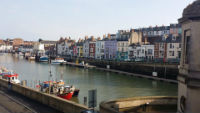 I am attending the Weymouth Leviathan, a maritime literary festival, in the lovely, historic port at the mouth of the River Wey in Dorset on the south-western coast of England. It is a fitting locale. Most of the writers attending write historical nautical fiction, history or both. Weymouth indeed has no shortage of interesting history.
I am attending the Weymouth Leviathan, a maritime literary festival, in the lovely, historic port at the mouth of the River Wey in Dorset on the south-western coast of England. It is a fitting locale. Most of the writers attending write historical nautical fiction, history or both. Weymouth indeed has no shortage of interesting history.
While Weymouth today is primarily a resort town, as a port, it dates back to the 12th century. Weymouth was officially registered as a port in 1252, largely as an export port for wool. Not all imports and exports were intended. In 1348, Weymouth was the entry point for a most undesirable import into Britain — the Black Death.
Weymouth was a favorite vacation spot for King George III, who first visited in 1789 and found the salt air to be invigorating as he recovered from his bouts of porphyria. Weymouth became the king’s favorite vacation spot and lead to the town becoming a major resort destination.
More recently, Weymouth served as a convalescent hospital during World War I for approximately 120,000 ANZAC personnel who were injured at Gallipoli or other theatres of the war.
In World War II, over half a million troops embarked for the Normandy invasion through Weymouth, including the American Rangers who scaled the cliffs at Pointe du Hoc on D-Day, June 6, 1944. The video below is footage of the 2nd & 5th Ranger Battalions departing Weymouth on D-Day.

Makes one wonder how many of those brave smiling waving Rangers made it back home to the States?
Trust you are enjoying Weymouth and Dorset Rick.
Sir George Somers one of the founding father’s of Bermuda had a farm outside Lyme Regis further along the coast – 1609 and all that.
Pingback: Travel News / Remembering Weymouth History at the Weymouth Leviathan
Wasn’t that far from there back in the mid 1990’s for work.
Did a lot of drinking after work in the pubs in Bournemouth to the east.
We did take a drive to see Stonehenge, but you have to be into that sort of thing to appreciate it.